初中英语语法大全现在完成时的结构和用法(练习附答案)
- 格式:docx
- 大小:20.57 KB
- 文档页数:7

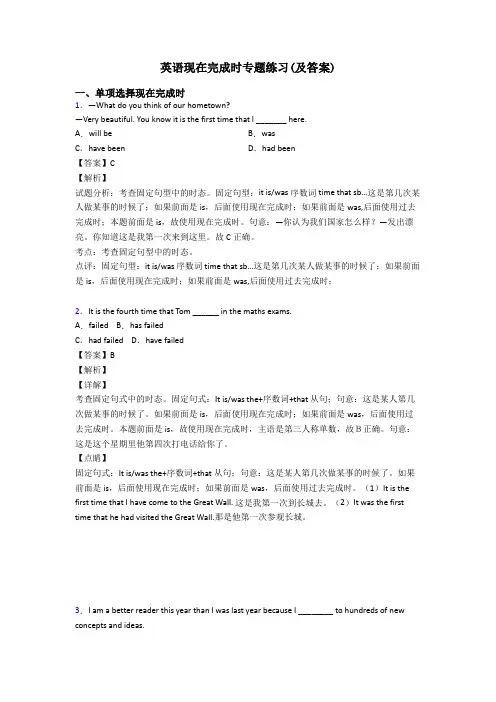
英语现在完成时专题练习(及答案)一、单项选择现在完成时1.―What do you think of our hometown?―Very beautiful. You know it is the first time that I _______ here.A.will be B.wasC.have been D.had been【答案】C【解析】试题分析:考查固定句型中的时态。
固定句型:it is/was 序数词time that sb…这是第几次某人做某事的时候了;如果前面是is,后面使用现在完成时;如果前面是was,后面使用过去完成时;本题前面是is,故使用现在完成时。
句意:—你认为我们国家怎么样?—发出漂亮。
你知道这是我第一次来到这里。
故C正确。
考点:考查固定句型中的时态。
点评:固定句型:it is/was 序数词time that sb…这是第几次某人做某事的时候了;如果前面是is,后面使用现在完成时;如果前面是was,后面使用过去完成时;2.It is the fourth time that Tom ______ in the maths exams.A.failed B.has failedC.had failed D.have failed【答案】B【解析】【详解】考查固定句式中的时态。
固定句式:It is/was the+序数词+that 从句;句意:这是某人第几次做某事的时候了。
如果前面是is,后面使用现在完成时;如果前面是was,后面使用过去完成时。
本题前面是is,故使用现在完成时,主语是第三人称单数,故B正确。
句意:这是这个星期里他第四次打电话给你了。
【点睛】固定句式:It is/was the+序数词+that 从句;句意:这是某人第几次做某事的时候了。
如果前面是is,后面使用现在完成时;如果前面是was,后面使用过去完成时。
(1)It is the first time that I have come to the Great Wall. 这是我第一次到长城去。
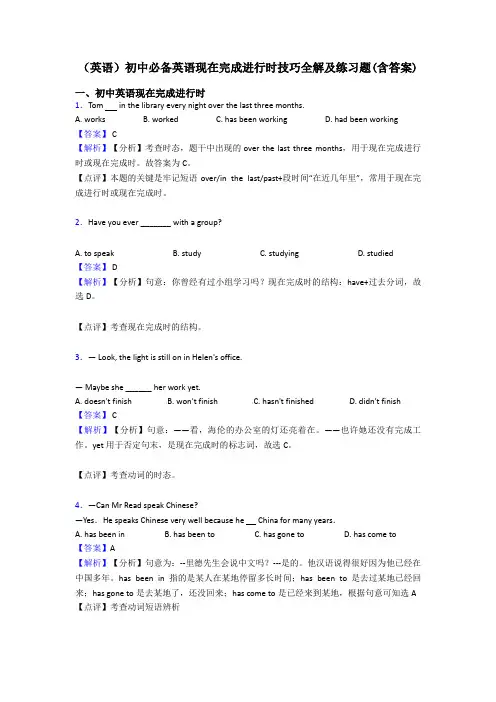
(英语)初中必备英语现在完成进行时技巧全解及练习题(含答案)一、初中英语现在完成进行时1.Tom in the library every night over the last three months.A. worksB. workedC. has been workingD. had been working【答案】 C【解析】【分析】考查时态,题干中出现的over the last three months,用于现在完成进行时或现在完成时。
故答案为C。
【点评】本题的关键是牢记短语over/in the last/past+段时间“在近几年里”,常用于现在完成进行时或现在完成时。
2.Have you ever _______ with a group?A. to speakB. studyC. studyingD. studied【答案】 D【解析】【分析】句意:你曾经有过小组学习吗?现在完成时的结构:have+过去分词,故选D。
【点评】考查现在完成时的结构。
3.— Look, the light is still on in Helen's office.— Maybe she ______ her work yet.A. doesn't finishB. won't finishC. hasn't finishedD. didn't finish【答案】 C【解析】【分析】句意:——看,海伦的办公室的灯还亮着在。
——也许她还没有完成工作。
yet用于否定句末,是现在完成时的标志词,故选C。
【点评】考查动词的时态。
4.—Can Mr Read speak Chinese?—Yes.He speaks Chinese very well because he China for many years.A. has been inB. has been toC. has gone toD. has come to【答案】A【解析】【分析】句意为:--里德先生会说中文吗?---是的。

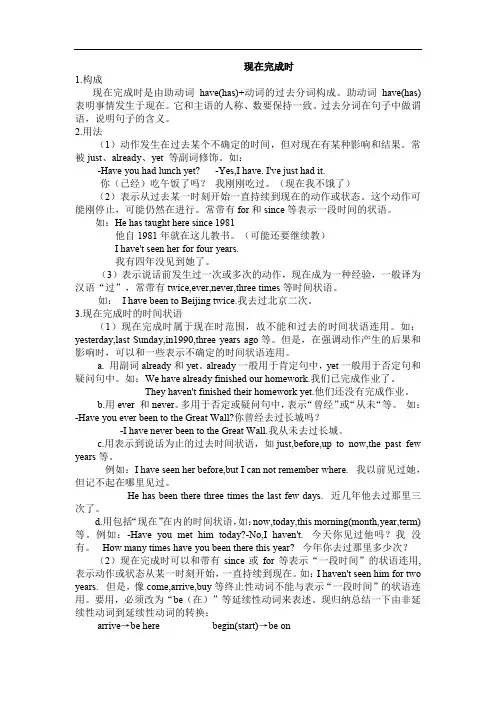
现在完成时1.构成现在完成时是由助动词have(has)+动词的过去分词构成。
助动词have(has)表明事情发生于现在。
它和主语的人称、数要保持一致。
过去分词在句子中做谓语,说明句子的含义。
2.用法(1)动作发生在过去某个不确定的时间,但对现在有某种影响和结果。
常被just、already、yet 等副词修饰。
如:-Have you had lunch yet? -Yes,I have. I've just had it.你(已经)吃午饭了吗?我刚刚吃过。
(现在我不饿了)(2)表示从过去某一时刻开始一直持续到现在的动作或状态。
这个动作可能刚停止,可能仍然在进行。
常带有for和since等表示一段时间的状语。
如:He has taught here since 1981他自1981年就在这儿教书。
(可能还要继续教)I have't seen her for four years.我有四年没见到她了。
(3)表示说话前发生过一次或多次的动作,现在成为一种经验,一般译为汉语“过”,常带有twice,ever,never,three times等时间状语。
如:I have been to Beijing twice.我去过北京二次。
3.现在完成时的时间状语(1)现在完成时属于现在时范围,故不能和过去的时间状语连用。
如:yesterday,last Sunday,in1990,three years ago等。
但是,在强调动作产生的后果和影响时,可以和一些表示不确定的时间状语连用。
a. 用副词already和yet。
already一般用于肯定句中,yet一般用于否定句和疑问句中。
如:We have already finished our homework.我们已完成作业了。
They haven't finished their homework yet.他们还没有完成作业。
b.用ever 和never。
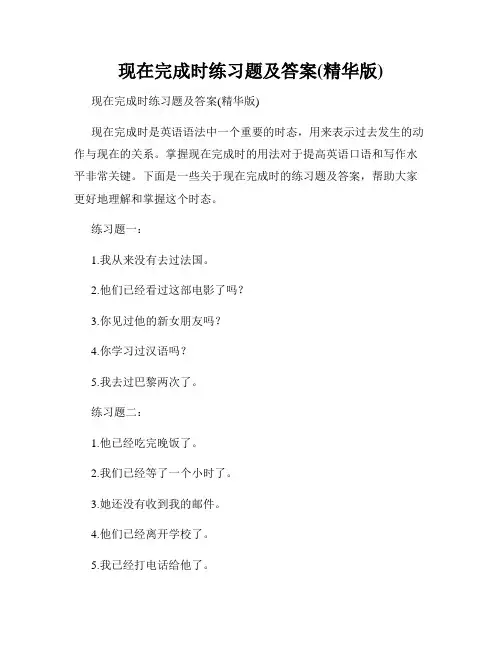
现在完成时练习题及答案(精华版)现在完成时练习题及答案(精华版)现在完成时是英语语法中一个重要的时态,用来表示过去发生的动作与现在的关系。
掌握现在完成时的用法对于提高英语口语和写作水平非常关键。
下面是一些关于现在完成时的练习题及答案,帮助大家更好地理解和掌握这个时态。
练习题一:1.我从来没有去过法国。
2.他们已经看过这部电影了吗?3.你见过他的新女朋友吗?4.你学习过汉语吗?5.我去过巴黎两次了。
练习题二:1.他已经吃完晚饭了。
2.我们已经等了一个小时了。
3.她还没有收到我的邮件。
4.他们已经离开学校了。
5.我已经打电话给他了。
练习题三:1.我已经做完作业了。
2.你刚才说过这个笑话了吗?3.他们已经买好了礼物。
4.我已经读完这本书了。
5.你已经看过这个电影了吗?练习题四:1.他们已经结婚十年了。
2.我们还没有决定去哪里度假。
3.她去过中国吗?4.你喝过咖啡吗?5.我已经完成了这个项目。
答案一:1. I have never been to France.2. Have they watched this movie?3. Have you seen his new girlfriend?4. Have you studied Chinese?5. I have been to Paris twice.答案二:1. He has finished dinner.2. We have been waiting for an hour.3. She hasn't received my email yet.4. They have left school.5. I have called him.答案三:1. I have finished my homework.2. Did you tell this joke just now?3. They have bought gifts.4. I have finished reading this book.5. Have you seen this movie?答案四:1. They have been married for ten years.2. We haven't decided where to go on vacation yet.3. Has she been to China?4. Have you ever drunk coffee?5. I have completed this project.。
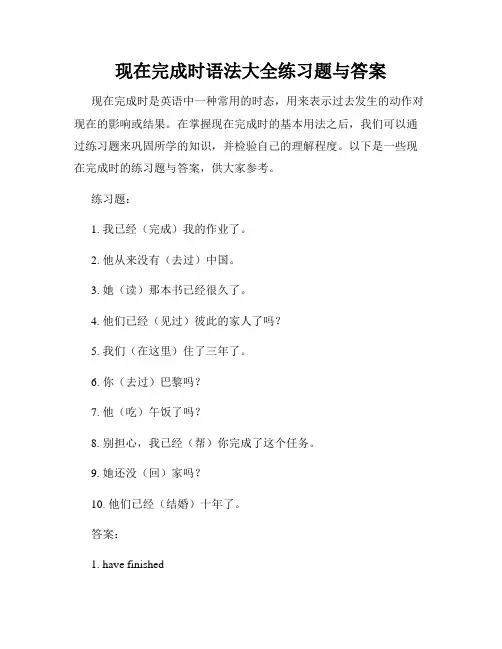
现在完成时语法大全练习题与答案现在完成时是英语中一种常用的时态,用来表示过去发生的动作对现在的影响或结果。
在掌握现在完成时的基本用法之后,我们可以通过练习题来巩固所学的知识,并检验自己的理解程度。
以下是一些现在完成时的练习题与答案,供大家参考。
练习题:1. 我已经(完成)我的作业了。
2. 他从来没有(去过)中国。
3. 她(读)那本书已经很久了。
4. 他们已经(见过)彼此的家人了吗?5. 我们(在这里)住了三年了。
6. 你(去过)巴黎吗?7. 他(吃)午饭了吗?8. 别担心,我已经(帮)你完成了这个任务。
9. 她还没(回)家吗?10. 他们已经(结婚)十年了。
答案:1. have finished2. been to3. has been reading4. Have they met each other's families?5. have been living here6. Have you been to Paris?7. Has he had lunch?8. Don't worry, I have helped you complete this task.9. hasn't gone home yet10. have been married for ten years以上是一些关于现在完成时的练习题,通过练习可以帮助我们更好地理解现在完成时的用法,并掌握常见动词的现在完成时形式。
希望这些练习题能对大家学习英语的过程有所帮助。
此外,记得在使用现在完成时时,要注意动词的正确形式,并与主语的单复数形式保持一致。
同时,还要注意说话的时间点,现在完成时通常强调过去的行为对现在造成的影响或结果。
总结:现在完成时是英语中一种常用的时态,用来表示过去发生的动作对现在的影响或结果。
通过练习题的学习和实践,我们可以更好地掌握现在完成时的用法,并巩固所学的知识。
希望大家在学习英语的过程中能够灵活运用现在完成时,提高自己的语言水平。
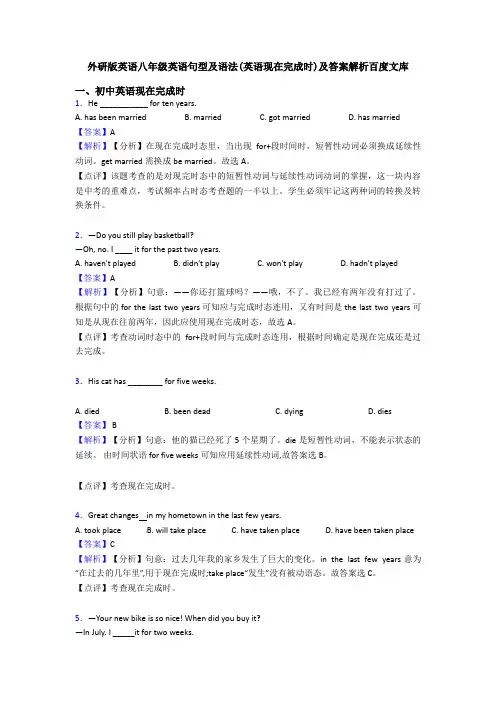
外研版英语八年级英语句型及语法(英语现在完成时)及答案解析百度文库一、初中英语现在完成时1.He ___________ for ten years.A. has been marriedB. marriedC. got marriedD. has married【答案】A【解析】【分析】在现在完成时态里,当出现for+段时间时,短暂性动词必须换成延续性动词。
get married需换成be married。
故选A。
【点评】该题考查的是对现完时态中的短暂性动词与延续性动词动词的掌握,这一块内容是中考的重难点,考试频率占时态考查题的一半以上。
学生必须牢记这两种词的转换及转换条件。
2.—Do you still play basketball?—Oh, no. I ____ it for the past two years.A. haven't playedB. didn't playC. won't playD. hadn't played【答案】A【解析】【分析】句意:——你还打篮球吗?——哦,不了。
我已经有两年没有打过了。
根据句中的for the last two years可知应与完成时态连用,又有时间是the last two years可知是从现在往前两年,因此应使用现在完成时态,故选A。
【点评】考查动词时态中的for+段时间与完成时态连用,根据时间确定是现在完成还是过去完成。
3.His cat has ________ for five weeks.A. diedB. been deadC. dyingD. dies【答案】 B【解析】【分析】句意:他的猫已经死了5个星期了。
die是短暂性动词,不能表示状态的延续。
由时间状语 for five weeks可知应用延续性动词,故答案选B。
【点评】考查现在完成时。
4.Great changes in my hometown in the last few years.A. took placeB. will take placeC. have taken placeD. have been taken place 【答案】C【解析】【分析】句意:过去几年我的家乡发生了巨大的变化。
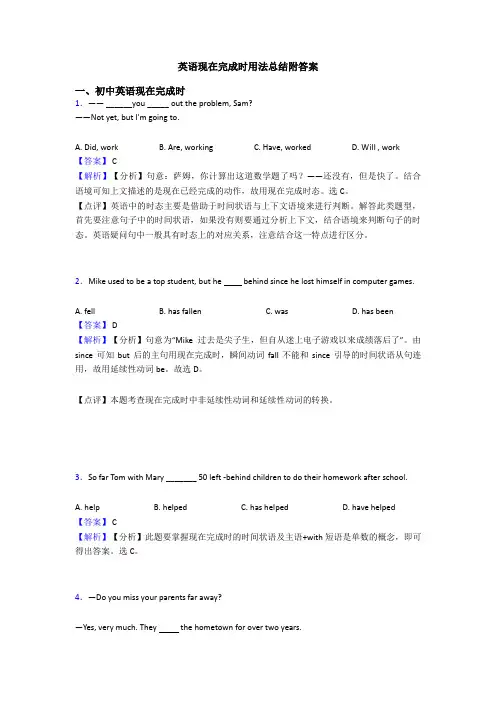
英语现在完成时用法总结附答案一、初中英语现在完成时1.—— ______you _____ out the problem, Sam?——Not yet, but I'm going to.A. Did, workB. Are, workingC. Have, workedD. Will , work【答案】 C【解析】【分析】句意:萨姆,你计算出这道数学题了吗?——还没有,但是快了。
结合语境可知上文描述的是现在已经完成的动作,故用现在完成时态。
选C。
【点评】英语中的时态主要是借助于时间状语与上下文语境来进行判断。
解答此类题型,首先要注意句子中的时间状语,如果没有则要通过分析上下文,结合语境来判断句子的时态。
英语疑问句中一般具有时态上的对应关系,注意结合这一特点进行区分。
2.Mike used to be a top student, but he behind since he lost himself in computer games.A. fellB. has fallenC. wasD. has been【答案】 D【解析】【分析】句意为“Mike过去是尖子生,但自从迷上电子游戏以来成绩落后了”。
由since可知but后的主句用现在完成时,瞬间动词fall不能和since引导的时间状语从句连用,故用延续性动词be。
故选D。
【点评】本题考查现在完成时中非延续性动词和延续性动词的转换。
3.So far Tom with Mary _______ 50 left -behind children to do their homework after school.A. helpB. helpedC. has helpedD. have helped【答案】 C【解析】【分析】此题要掌握现在完成时的时间状语及主语+with 短语是单数的概念,即可得出答案。
选C。
4.—Do you miss your parents far away?—Yes, very much. They the hometown for over two years.A. leftB. have leftC. were away fromD. have been away from【答案】 D【解析】【分析】根据句意“他们已经离家两年多了”可知用现在完成时,时间状语for over two years 表示时间段,动词要具有延续性,left是 leave的过去分词,是短暂性动词,不能和时间段连用,故选D。
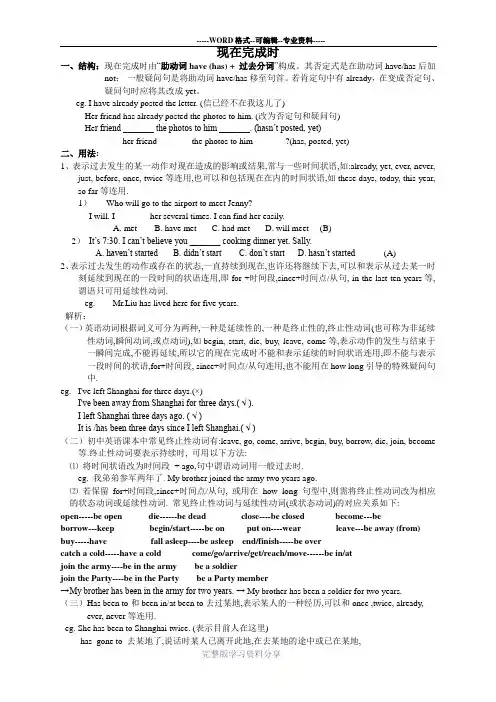
现在完成时一、结构:现在完成时由“助动词have (has) + 过去分词”构成。
其否定式是在助动词have/has后加not;一般疑问句是将助动词have/has移至句首。
若肯定句中有already,在变成否定句、疑问句时应将其改成yet。
eg. I have already posted the letter. (信已经不在我这儿了)Her friend has already posted the photos to him. (改为否定句和疑问句)He r friend _______ the photos to him _______. (hasn’t posted, yet)_______ her friend _______ the photos to him _______?(has, posted, yet)二、用法:1、表示过去发生的某一动作对现在造成的影响或结果,常与一些时间状语,如:already, yet, ever, never,just, before, once, twice等连用,也可以和包括现在在内的时间状语,如these days, today, this year, so far等连用.1)--- Who will go to the airport to meet Jenny?--- I will. I _______ her several times. I can find her easily.A. metB. have metC. had metD. will meet (B)2)It’s 7:30. I can’t believe you _______ cooking dinner yet, Sally.A. haven’t startedB. didn’t startC. don’t startD. hasn’t started(A)2、表示过去发生的动作或存在的状态,一直持续到现在,也许还将继续下去,可以和表示从过去某一时刻延续到现在的一段时间的状语连用,即for +时间段,since+时间点/从句, in the last ten years等,谓语只可用延续性动词.eg. Mr.Liu has lived here for five years.解析:(一)英语动词根据词义可分为两种,一种是延续性的,一种是终止性的,终止性动词(也可称为非延续性动词,瞬间动词,或点动词),如begin, start, die, buy, leave, come等,表示动作的发生与结束于一瞬间完成,不能再延续,所以它的现在完成时不能和表示延续的时间状语连用,即不能与表示一段时间的状语,for+时间段, since+时间点/从句连用,也不能用在how long引导的特殊疑问句中.eg. I've left Shanghai for three days.(×)I've been away from Shanghai for three days.( √ ).I left Shanghai three days ago. ( √ )It is /has been three days since I left Shanghai.( √ )(二)初中英语课本中常见终止性动词有:leave, go, come, arrive, begin, buy, borrow, die, join, become 等.终止性动词要表示持续时, 可用以下方法:⑴将时间状语改为时间段+ ago,句中谓语动词用一般过去时.eg. 我弟弟参军两年了. My brother joined the army two years ago.⑵若保留for+时间段,since+时间点/从句, 或用在how long 句型中,则需将终止性动词改为相应的状态动词或延续性动词. 常见终止性动词与延续性动词(或状态动词)的对应关系如下:open-----be open die------be dead close----be closed become---beborrow---keep begin/start-----be on put on----wear leave---be away (from) buy-----have fall asleep----be asleep end/finish-----be overcatch a cold-----have a cold come/go/arrive/get/reach/move------be in/atjoin the army----be in the army be a soldierjoin the Party----be in the Party be a Party member→My brother has been in the army for two years.→ My brother has been a soldier for two years.(三)Has been to和been in/at been to去过某地,表示某人的一种经历,可以和once ,twice, already, ever, never等连用.eg. She has been to Shanghai twice. (表示目前人在这里)has gone to 去某地了,说话时某人已离开此地,在去某地的途中或已在某地,eg. She has gone to Shanghai。
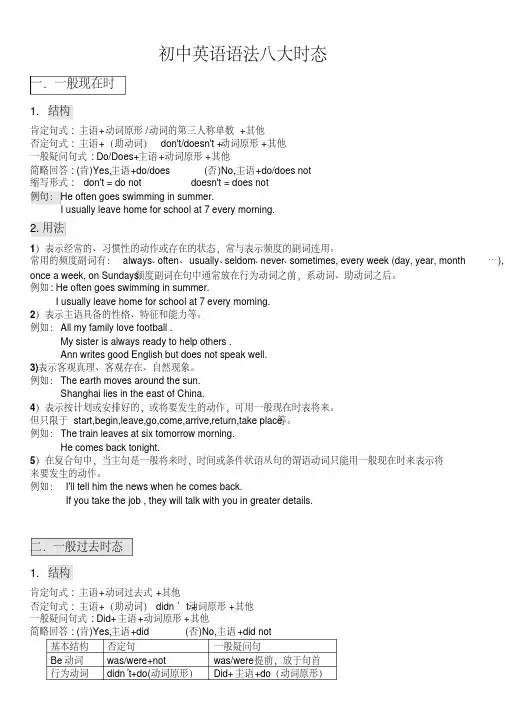
初中英语语法八大时态一.一般现在时1.结构肯定句式: 主语+动词原形/动词的第三人称单数+其他否定句式: 主语+(助动词)don't/doesn't +动词原形+其他一般疑问句式: Do/Does+主语+动词原形+其他简略回答: (肯)Yes,主语+do/does (否)No,主语+do/does not缩写形式: don't = do not doesn't = does not例句:He often goes swimming in summer.I usually leave home for school at 7 every morning.2.用法1)表示经常的、习惯性的动作或存在的状态,常与表示频度的副词连用。
常用的频度副词有:always、often、usually、seldom、never、sometimes, every week (day, year, month…), once a week, on Sundays.频度副词在句中通常放在行为动词之前,系动词、助动词之后。
例如: He often goes swimming in summer.I usually leave home for school at 7 every morning.2)表示主语具备的性格、特征和能力等。
例如:All my family love football .My sister is always ready to help others .Ann writes good English but does not speak well.3)表示客观真理、客观存在、自然现象。
例如:The earth moves around the sun.Shanghai lies in the east of China.4)表示按计划或安排好的,或将要发生的动作,可用一般现在时表将来。
初中英语语法八大时态一.一般现在时1. 结构肯定句式: 主语+动词原形/动词的第三人称单数+其他否定句式: 主语+(助动词)don't/doesn't +动词原形+其他一般疑问句式: Do/Does+主语+动词原形+其他简略回答: (肯)Yes,主语+do/does (否)No,主语+do/does not缩写形式: don't = do not doesn't = does not例句:He often goes swimming in summer.I usually leave home for school at 7 every morning.2.用法1)表示经常的、习惯性的动作或存在的状态,常与表示频度的副词连用。
常用的频度副词有:always、often、usually、seldom、never、sometimes, every week (day, year, month…), once a week, on Sundays.频度副词在句中通常放在行为动词之前,系动词、助动词之后。
例如: He often goes swimming in summer.I usually leave home for school at 7 every morning.2)表示主语具备的性格、特征和能力等。
例如:All my family love football .My sister is always ready to help others .Ann writes good English but does not speak well.3)表示客观真理、客观存在、自然现象。
例如:The earth moves around the sun. Shanghai lies in the east of China.4)表示按计划或安排好的,或将要发生的动作,可用一般现在时表将来。
初中英语语法现在完成时初中英语语法现在完成时1、现在完成时的构成:现在完成时是由“助动词have/has+动词过去分词”构成的。
①助动词have/has可以与主语缩写为’ve/’s。
e.g. I have → I’ve We have → We’ve He has → He’s It has →It’s②规则变化的过去分词与动词过去式一样。
③不规则变化的动词过去分词见表。
2、现在完成时的基本句型。
①陈述句肯定形式。
e.g. I have had lunch. 我已经吃过午饭了。
He has gone to Beijing. 他去北京了。
②陈述句否定形式。
(在助动词have/has后+not,可缩写为haven’t/hasn’t)e.g. I haven’t had lunch. 我还未吃午饭。
He hasn’t gone to Beijing. 他还没有去北京。
③一般疑问句形式及其答语。
(将助动词have/has提前,答语一般用have, has回答)e.g. Have you had lunch? 你吃过午饭了没? Yes, I have. No, I haven’t.Has he gone to Beijing? 他去过北京了没有? Yes, he has. No, he hasn’t.否定回答还可以用:No, not yet. / No, never. / No, not even once等。
④特殊疑问句形式。
(疑问词+一般疑问句)e.g. Where has he gone? 他去了哪里?3、现在完成时的三个基本用法。
(1) 现在完成时的第一个基本用法表示过去发生或已完成的某一个动作对现在造成的影响或结果。
e.g. Have you had lunch? Yes, I have. I’ve just had it. 你吃过午饭没?有,吃过了,我刚刚吃的。
(影响及结果:我现在饱了,不需要了)He has gone to Beijing. 他已经去北京了。
初一英语语法现在完成时练习现在完成时数去的动作或状态持续到现在并且已经完成,对现在造成的影响,可能持续发生下去。
在英语时态中,“时“指动作发生的时间,”态“指动作的样子和状态。
接下来小编为大家介绍初一英语学习的相关内容,一起来看看吧!初一英语语法现在完成时练习一、概念:过去发生或已经完成的动作对现在造成的影响或结果,或从过去已经开始,持续到现在的动作或状态二、现在完成时用法之常用词语:能与现在完成时连用词语很多,如副词just, already, yet, before, ever, recently 等,但下面是一些典型而且重要的例子:(1) since(自从):不管用作介词、连词还是副词, 句子(主句)谓语通常都用现在完成时:I haven’t seen her since last week. 自上周以来我一直未见过她。
Where have you been since I last saw? 自我上次见到你之后你到哪里去了?【注】有时可用其他时态的情况,但须注意:① 对于某些表示状态的动词(如seem 等),或因语义等方面的原因,有时可能用一般现在时比较现在完成时更合适:It seems like years since we last met. 我们似乎几年未见面了。
Since when does the $42 plus $5 service charge come to $48? 从什么什候开始42元加5元的服务费等于48元了?② 若不是指从过去持续到现在,而是指从较远的过去持续到在一个较近的过去,则用过去完成时:Yester day he told me that he hadn’t eaten anything since Tuesday. 他昨天告诉我自星期二以来他一直未吃任何东西。
(指从星期二至昨天未吃东西)③ 表示时间长度时,通常用一般现在时代替现在完成时:It’s ten years since he left here. 他离开这儿已10年了。
一、时态讲解:现在完成时1构成:现在完成时由助动词have + 过去分词构成,助动词have 有人称和数的变化;第三人称单数用has,其余用have.现在完成时的否定式直接在助动词后面加上not、疑问式是把助动词提到主语之前;以2用法:1现在完成时通常表示在说话之前已经完成的动作或存在的状态;说话人强调的是该动作或状态对现在的结果或影响;My daughter has just gone out. 我女儿刚出去;I’m sure we’ve met before. 我肯定我们以前见过面;She has arrived. 她到了;2表示持续到现在的动作或状态,往往和包括现在在内的表示一段时间的状语连用,如recently, already, just, lately, for…, since…,yet等;如:I hav en’t heard from her these days. 这些日子我没有收到她的信;We haven’t seen you recently. 最近我们没有见到你;They have been away for two years. 他们离开已经两年了;She has been with us since Monday.★注意:a)since和for的区别since后接时间点,如1993,last term, yesterday, the time I got therefor后接一段时间,表示“长达多久”,如ten years, a while, two days等;Exercise: 用since和for填空1. Jim has been in Ireland ______ Monday.2. Jill has been in Ireland ______ three days.3. His aunt has lived in Australia ______15 days.4. Mary is in her office. She has been there ______ 7 o'clock.5. India has been an independent country ______1974.6. The bus is late. They've been waiting ______ 20 minutes.7. Nobody lives in those houses. They have been empty ______ many years.8. Mike has been ill ______a long time. He has been in hospital ______ October.2表示短暂意义的动词如arrive, leave, borrow, buy, begin, start, die等,在完成时当中不能和表示一段时间的状语连用,因为它们表示的动作不可能持续;因此,不能说:He has come here for 2 weeks. ×The old man has died for 4 months. ×They have left only for 5 minutes. ×以上三句话可以改为:He has been here for 2 weeks.The old man has ______ _______ for 4 months.They have _____ _____ only for 5 minutes2have has been 和have has gone的区别:表示“曾到过某地”要用“have has been”; 表示“已经去某地”要用“have has gone”;试比较:Where has he been 他刚才到哪里去了已经回来了Where has he gone 他上哪儿去了人不在They have been to Canada. 他们到过加拿大;现在已经不在加拿大They have gone to Canada. 他们到加拿大去了;可能在路上和已经到加拿大.3现在完成时不能和表示过去的时间状语连用,如yesterday, last year, in 1976, two days ago, just now, when I came in,但可以和already, yet, sometimes, always, often, before, lately, recently, once, twice, ever, never等连用;例如:She has already come. 她已经来了;I haven’t read it yet. 我还没读过这个;I have met him before. 我从前曾见过他;Ma Hong has always been a good student. 马红一直是个好学生;I have often seen him in the street. 我经常在街上看见他;They have never been to Yan’an. 他们从未去过延安;I haven't seen him lately. 我近来没看到他;Exercise:I. Fill in the blanks with the proper form.1. I____ already ____ see the film. I ________ see it last week.2. _____ he ____ finish his work today Not yet.3. My father ____ just ____ come back from work. He is tired now.4. Where’s Li Ming He __________ go to the teacher’s office.5. I __________ work here since I ______ move here in 1999.6. So far I _______________make quite a few friends here.7. How long ________ the Wangs ______________stay here For two weeks.8. I ________ just ___________ finish my homework.9. He ________ go to school on foot every day.you ______ find your science book yet11. If it ____ be fine tomorrow, I'll go with you.12. The students ____________ read English when the teacher came in.13. Look The monkey __________ climb the tree.14. My mother __________ come to see me next Sunday.15. I've lost my pen. _________ you ________ see it anywhereII. Choose the best answer.1. How long have you _______ hereA. comeB. gotC. arrivedD. been2. My grandpa died _________.A. at the age of my 2B. for 2 yearsC. when I was 2.D. my age was 6.3. Jane has _____ to BeiJing. She will come back tomorrow.A. beenB. goneC. wentD. never been4. It is ten years _____ I last saw her.A. afterB. sinceC. forD. thatwill go to the station to meet Lorry--I will. I _____ her several times.A. metB. have metC. had metD. will meet6. --What a nice dress How long _____ you _____ it--Just 2 weeks.A. will, buyB. did, buyC. are, havingD. have, had you know Lydia very well--Yes, She and I _____ friends since we were very young.A. have madeB. have becomeC. have beenD. have turned8. The Smiths _______ in China for 8 years.A. has livedB. livedC. have beenD. live9. --Hello, this is Mr. Green speaking. Can I speak to Mr. Black-- Sorry. He ______ the Bainiao Park.A. has been toB. has gone toC. went toD. will go to10. --____ you ever ____ to the US-- Yes, twice.A. Have, goneB. Have, been C, Do, go D. were, going III. Rewrite the sentences.1. I have been to Macau before. 改为否定句I _________ _________ been to Macau before.2. He hasn’t come to school because he was ill. 就划线部分提问______ _______ he come to school3. I bough a new bike just now. 用just改写I ____ just ____ a new bike.4. We began to learn English three years ago.改为同义句We ____ ____English ____three years5. He has never surfed, _______ _______改成反意疑问句6. They have been here since 2000. 对划线部分提问_______ _______have they been here7. The old man _________ last year. He has _______ _______for a year. die 动词填空8. Miss Gao left an hour ago. 同义句转换Miss Gao has _______ ________ ________ an hour ago.Ask the questions1 I have been there for two days.__________ _________ __________ you __________ __________2 My father has lived here since 2000._________ _________ __________ your father _________ __________3 He left here yesterday._________ ________ he _________ __________4 They bought a book two hours ago.__________ ___________ they __________ a bookUse “never, ever, already, just, yet, for, since” to fill in the blanks.1. I have _______ seen him before, so I have no idea about him.2. Jack has _________ finished his homework.3. Mr. Wang has taught in this school ________ ten years.4. “Have you ________ seen the film”“No, I have ________ seen it.”5. “Has the bus left _______” “Yes, it has _________ left.”现在完成时练习题及答案一、翻译下列句子:你曾经吃过鱼和薯条吗2. 我刚刚丢了我的化学书;3. 我以前从来没去过那个农场;4. 他已经吃过午饭5. 你已经看过这部电影了吗6. 我哥哥还没回来;7.这本字典我已买了三年了;8.他离开中国三年了;9.我认识他们五年了;10.他们已去了美国五年了;11.自从他搬到济宁,他就住这儿了;12.我妹妹成为一个大学生已经三年;13.自从1999年以来他们就认识;14.我来到这个学校已3年多了;二、用since和for填空years years month 19994 o’clock7 4 hours hour ago9. ___we were children lunch time she left here12. He has lived in Nanjing ___ the year before last.13. I’ve known him ______ we were children.14. Our teacher has studied Japanese ______ three years.15. She has been away from the city ______ about ten years.16. It’s about ten years __________ she left the city.三、结束性动词转换为以下延续性动词或者表示可以延续的状态的短语;①arrive at / in sp / get to / reach sp / come / go / move to sp→be in sp / at school / at home / on the farm / be here / be there1 He got to Beijing five minutes Beijing for .2 I moved to the USA in 2008. I the USA since .3 I went home yesterday. I home for .4 They came here last week. They ___________ here since _____________.②come to / go back to / return to→be back to go out →be out1 He came out two years ______________ for ____________.2 We return to Beijing ___ ____________ to Beijing since __________.③become →be1 I became a teacher in 2000. I ________________ a teacher for _________________.2 The river became dirty last year. The river _______ _______ dirty for _______ ________.④close →be closed open →be open1 The shop closed two hours ago. The shop _______________ ______ for _________________.2 The door opened at six in the door ________ ________ ________ for six hours.⑤get up →be up;die →be dead;leave sp. →be away from sp.fall asleep / get tot sleep →be asleep;finish / end →be over;marry →be married;1 I got up two hours ________ ______ _______since _______________.2 He left Shanghai just _______ _____________ ______ Shanghai for five minutes.3 My grandpa died in grandpa _______ _____ ______for _______ ________.4 The meeting finished at meeting ________ ______ ______ for six hours.5 I got to sleep two hours ago .I ________ _____ ___ since _________ _________.6 They married in 1990. They ________ _________ __________since _________.⑥start / begin to do sth. →do sth. ;begin →be on1 I began to teach at this school in 1995. I ____ ____ at this school since ____.2 The film began two minutes ago. The film ____ ____ ____ for ____ ____.⑦borrow →keep;lose →not have ;buy →have ;put on →wear catch / get a cold →have a cold;get to know →know1 They borrowed it last week. They __________it since _____________.2 I bought a pen two hours ago. I ____________a pen for _____________.3 I got to know him last year. I ___________ him since ___________.4 I put on my glasses three years ago. I _________ my glasses for ______________.⑧have / has gone to →have been inHe has gone to _____________ Beijing for two days.⑨join the league / the Party / the army→be a league member /a Party member / a soldier→be a member of the league / the Party→be in the league / the Party / the army1 He joined the league in 2002.He _________________ a _________________ for two years.He ___________ a _________ the ________ for two years.He _______________________ the league for two years.2 My brother joined the army two years ago.My brother _________a ________ for ___________ ___________.My brother ___________ in ___________ for two years.四、划线提问1 I have been there for two days.__________ _________ __________ you __________ __________2 My father has lived here since 2000._________ _________ __________ your father _________ __________3 He left here yesterday._________ ________ he _________ __________4 They bought a book two hours ago.__________ ___________ they __________ a book五、用havehas been 或havehas gone 填空;A: Where ____________ Li Fei ___________B: He ____________ to Hainan Island.A: How long ___________ he ___________ thereB: He _____________ there for three days.A: When will he come back , do you knowB: I’m afraid he won’t come back recently.A: Could you tell me the way to Hainan IslandB: Sorry, I _________ never ___________ there.A: How many times ___________ Li Fei __________ to that placeB: He _____________ there only once.六、用have / has been to / in, have gone to及go的各种形式填空;1 Where is Jack He __________ his country.2 David ________ the park just now.3 John _______ England since he came back.4 How long _____ they _____ this village5 The Smiths ______ Beijing for years.6 _____ you ever ____ America -- Yes, I _____ there many times.7 I _____ this school since three years ago.8 Where is Jim He _____ the farm.9 When_____ he _____ He _______ an hour ago.10 Would you like to _____ to the zoo with me ---Yes, but I _____ there before.11 Where _____ you _____ now --- I ____ to the zoo.12 He often _____ swimming.13 _____ you ______ there last year14 _____ they often ______ skating in winter七用never, ever, already, just, yet, for, since填空1. I have _______ seen him before, so I have no idea about him.2. Jack has _________ finished his homework.3. Mr. Wang has taught in this school ________ ten years.4. “Have you ________ seen the film” “No, I have ________ seen it.”5. “Has the bus left _______” “Yes, it has _________ left.”八. 用适当的时态填空:’s _____________ live here ever since she was ten.of them ________________ be in Hongkong for ten days.of them ____________ come to Hongkong ten days ago.4. Half an hour __________ pass since the train __________ leave.5. Mary________lose her pen. ________ you _______see it here and there6. _________ you _____ find your watch yet7. ---Are you thirsty ---No I _________just _________ have some orange.8. We ---- already _________ return the book.9. ________ they _______ build a new school in the village10. I _____________not finish my homework . Can you help me11. My father _____ read the novel twice.12. I _________ buy a book just now.13. I _________ lost my watch yesterday.14. My father ___________ read this book since yesterday.参考答案:1. since2. for3. for4. since5. since6. for7. for8. since1. have, seen, saw2. Has, finished3. has, come4. has gone5. have worked, moved6. have made7. have, stayed8. have, finished9. goes 10. have, found 11. is 12. were reading 13. is climbing 14. is coming 15. Have, seenKeys: 1. How long have, been there 2. How long has, lived here 3. When did, leave here 4. When did, buyKeys: 1. never 2. just , already 3. for 4. ever, never 5. yet , just / already现在完成时态练习题答案一.翻译下列句子:1. Have you ever had / eaten fish and chips2. I have just lost my chemistry book.3. I have never been to the farm before.4. He has already had lunch = He has had lunch already.5. Have you seen the movie yet6. My brother hasn’t come /get / been back yet = My brother hasn’t returned yet.7. I have had this dictionary for three years / since three years ago.8. Has been away from China for three years.9. I have known them for five years.10. They have been in the USA for five years.11. He has been here since he moved to Jining.12. My sister has been a college student for three years = My sister has been in college for three years.13. They have known each other since 1999.14. I have been in this school for over three years.二、用since或者for填空1. for2. since3. since4. since5. since6. since7. for 8 since 10. since11. since 13. since16. since三、结束性动词转换为以下延续性动词或者表示可以延续的状态的短语① 1. has been in , five minutes2. have been in , 20083. have been at, two days4. have been , last week② 1. have been out, two years2. have been back , yesterday③ 1. have been , nine years2. has been , two years④ 1. has been closed , two hours2. has been open⑤ 1. have been up , two hours ago2. has been away from3. has been dead , seven years4. has been over5. have been asleep , two hours ago6. have been married , 1990⑥ 1. have taught , 19952. has been on , two minutes⑦ 1. have kept , last week2. have had , two hours3. have known , last years4. have worn , three years⑧has been in⑨has been , League memberhas been , member of , Leaguehas been in2. has been , soldier , two yearshas been , the army四、划线提问1. How long have, been there2. How long has , lived here3. When did , leave here4. When did , buy五、用havehas been 或havehas gone 填空;A: Where has Li Fei goneB: He has gone to Hainan Island.A: How long has he been thereB: He has been there for three days.A: When will he come back, do you knowB: I’m afraid he won’t come back recently.A: Could you tell me the way to Hainan IslandB: Sorry, I have never been there.A: How many times has Li Fei been to that placeB: He has been there only once.六、用have / has been to / in, have gone to及go的各种形式填空;1. has gone t2. went to3. has been in4. have , been in5. have been in6. Have , been to ; have been7. have been in / at 8. has gone to9. did go ; went 10. go ; have been11. are , going ; am going 12. goes13. Did , go 14. Do , go七、综合练习:1. never2. just , already3. for4. ever, never5. yet , just / already八. 用适当的时态填空:1. lived / has been living2. have been3. went4. has passed ; left5. has lost ; have , seen6. Have , found7. have , had 8. have , returned9. Have , built 10. haven’t finished11. has read 12. bought 13. lost14. have been reading / has read。
现在完成时【现在完成时】A.表示过去发生或已经完成的动作对现在造成的影响或结果,或从过去已经开始,持续到现在的动作或状态。
【常用时间状语】recently, lately, since+时间点, for+数字+时间名词, in the past few months/years等【构成】肯定形式:have/has + done否定形式:have/has + not +done一般疑问句:have或has放于句首B.现在完成时的用法1)现在完成时所表示的动作在说话之前已完成,而对现在有影响。
eg. The car has arrived.车子来了。
(结果:车子已在门口)Someone has broken the window.有人把窗户打破了。
(结果:窗户仍破着)区别:have been to, have gone to, have been inhave been to,表示去过某个地方,不过现在已经回来了have gone to表示去了,但还没有回来,也许是在去的途中have been in指的是在某个地方,从过去一直延续到现在例如:你以前去过北京么?例如:A: Is Mr.Wang at home?B: No,he is not in,(他去香港了)2)现在完成时所表示的动作开始于过去,持续到现在,也许还会持续下去。
常用for和since表示一段时间的状语或so far,now,today,this week (month,year)等表示包括现在时间在内的状语。
eg. He has studied English for 5 years.He has studied English since 2001.Now I have finished the work.注意:表示短暂时间动作的词,如:come,go,die,marry,buy等的完成时不能与for,since等表示一段时间的词连用。
初中英语语法大全|现在完成时的结构和用法(练习附答案)(一)基本结构现在完成时的句子结构一般为:主语+have/has+过去分词+其他成分如:We have already had lunch.He has been away for a week.(二)主要用法1、表示过去发生并且已经完成的动作对现在造成的影响或结果。
此时,常和谓语动词一起使用的副词有already、just、never、ever、yet 等。
如:They have already come back from the museum.She has already finished her homework.2、表示过去发生的动作持续到现在,并且有可能会继续持续下去。
此时,常和谓语动词一起使用的标志性词语主要有for和since,而且此时的谓语动词往往是持续性动词(如stay、keep、wait等)。
如:I have lived here for ten years.He has kept the clavichord since thirty years ago.3、表示从过去某一时间到说话时这段时间中反复发生的动作。
此时,常和谓语动词一起使用的主要是表频度的副词often、always、seldom、never等,以及表次数的单词或短语(如once、twice、three times)。
如:You have never listened to me like this before.She has ever been to France.They have visited the Summer Palace many times.(三)动词的过去分词1、规则变化其变化规则与动词的一般过去时基本相同,主要是在词尾加-ed或-d。
具体的有:1)直接加-ed。
如:worked、played。
2)以不发音的e结尾的动词后加-d。
如:lived、danced。
3)以辅音字母加y结尾的动词后改y为i,再加-ed。
如:studied、cried。
4)以重读闭音节结尾的动词后,双写最后一个辅音字母再加-ed。
如:stopped、patted。
2、不规则变化如果结合动词的过去式,动词的过去分词的不规则变化中,又有一些相对的规则现象。
如:1)AAA型。
如:put put put;read read read。
其中,read的过去式和过去分词虽然拼写时一样的,但其发音与原形不同,ea不再读作[iː],而是[e]。
2)AAB型。
如:beat beat beaten3)ABB型。
如:keep kept kept;sit sat sat4)ABC型。
如:lie lay lain;drink drank drunk5)ABA型。
如:run ran run;come came come(四)标志性词语1、副词already、just、never、ever、yet等。
如:She hasn't arrived in Scotland yet.They have just left for Shanghai.2、for和since。
for+一段时间,since+具体时间。
如:He has learned Italian for five months.He has learned Italian since five months ago.3、so far和up to/till now。
表示“迄今为止”。
如:So far, no one has heard any news about her.She has read fifty books up to now.4、recently、lately等表示“最近;最新”的副词和形容词。
如:I've met her on several occasions recently.He hasn't had enough sleep lately.5、in the past/last+一段时间,表示“在过去的...时间里”。
如:In the past few years, new buildings have sprung up all over Beijing. He had aged rapidly in the last few months.6、次数。
如:I've tried many times, but there's no way.He has been there at least twice.(五)have been to/have gone to/have been in1、have been to表示“去过已回”。
句子主语就在现场。
如:They have been to Rome many times.She has been to Shanghai more than once.2、have gone to表示“去了未回”。
句子主语不在现场。
如:Jerry has gone to Hangzhou.Mary has gone to Finland.3、have been in表示“一直待在某地”。
如:We have been in Beijing for five weeks.They have been in China since 2012.(六)短暂性动词和延续性动词所谓短暂性动词主要是指一旦发生马上就结束的动作,也叫瞬间动词,如die、marry、leave等。
而延续性动词主要是指可以一直持续进行的动作,也叫持续性动词,如learn、live、talk等。
两类动词都可以用于现在完成时,但是短暂性动词不能与表示一段时间的时间状语连用。
此时,需要把短暂性动词改为相应的表状态的动词或短语。
如:错误:He has died for ten years.正确:He has been dead for ten years.错误:She has married him since five years ago.正确:She has been married to him since five years ago.(七)句型转换因为“have/has done”中的have/has是助动词,所以在进行句型转换中要注意不需要再另外借助助动词do/did/does,而是直接借用have/has。
如:肯定句:He has lived here for the last few years.否定句:He hasn't lived here for the last few years.一般疑问句:Has he lived here for the last few years?特殊疑问句:How long has he lived here? (划线部分为for the last few years)现在完成时专项练习一.用所给词的正确形式填空。
1. I____ already ____ (see) the film. I ________ (see) it last week.2. _____ he ____ (finish) his work today? Not yet.3. My father ____ just ____ (come) back from work. He is tired now.4. Where’s Li Ming ? He __________ (go) to the teacher’s office.5. I __________ (work) here since I ______ (move) here in 1999.6. So far I _______________(make) quite a few friends here.7. How long ________ the Wangs ______________(stay) here ? For two weeks.8. I ________ just ___________ (finish) my homework.9. He ________ (go) to school on foot every day.10.____ you ______ (find) your science book yet?11. If it ____ (be) fine tomorrow, I'll go with you.12. The students ____________ (read) English when the teacher camein.13. Look! The monkey __________ (climb) the tree.14. My mother __________ (come) to see me next Sunday.15. I've lost my pen. _________ you ________ (see) it anywhere?二. 单项选择.1. How long have you _______ here?A. comeB. gotC. arrivedD. been2. My grandpa died _________.A. at the age of my 2B. for 2 yearsC. when I was 2.D. my age was 6.3. Jane has _____ to BeiJing. She will come back tomorrow.A. beenB. goneC. wentD. never been4. It is ten years _____ I last saw her.A. afterB. sinceC. forD. that5.--Who will go to the station to meet Lorry?--I will. I _____ her several times.A. metB. have metC. had metD. will meet6. --What a nice dress! How long _____ you _____ it?--Just 2 weeks.A. will, buyB. did, buyC. are, havingD. have, had7.--Do you know Lydia very well?--Yes, She and I _____ friends since we were very young.A. have madeB. have becomeC. have beenD. have turned8. The Smiths _______ in China for 8 years.A. has livedB. livedC. have beenD. live9. --Hello, this is Mr. Green speaking. Can I speak to Mr. Black?-- Sorry. He ______ the Bainiao Park.A. has been toB. has gone toC. went toD. will go to10. --____ you ever ____ to the US? -- Yes, twice.A. Have, goneB. Have, been C, Do, go D. were, going三.句型转换1. I have been to Macau before. (改为否定句)I _________ _________ been to Macau before.2. He hasn’t come to school because he was ill. (就划线部分提问)______ _______ he come to school?3. I bough a new bike just now. (用just改写)I ____ just ____ a new bike.4. We began to learn English three years ago.(改为同义句)We ____ ____English ____three years5. He has never surfed, _______ _______? (改成反意疑问句)6. They have been here since 2000. (对划线部分提问)_______ _______have they been here?7. The old man _________ last year. He has _______ _______for a year. (die) (动词填空)8. Miss Gao left an hour ago. (同义句转换)Miss Gao has _______ ________ ________ an hour ago.答案:一. 1 have, seen, saw 2 has, finished 3 has, come 4 hasgone 5 have worked, moved 6 have made 7 have, stayed 8 have, finished 9 goes 10 have, found 11 is 12 were reading 13 is climbing 14 will come 15 have, seen二.1.D 2. C 3.B 4.B 5.B 6.D 7.C 8.C 9.B 10.B三.1 have not 2. Whyhasn’t 3. have, just 4 have learnt, for 5 has he 6how long 7 died, been dead 8 been away since。